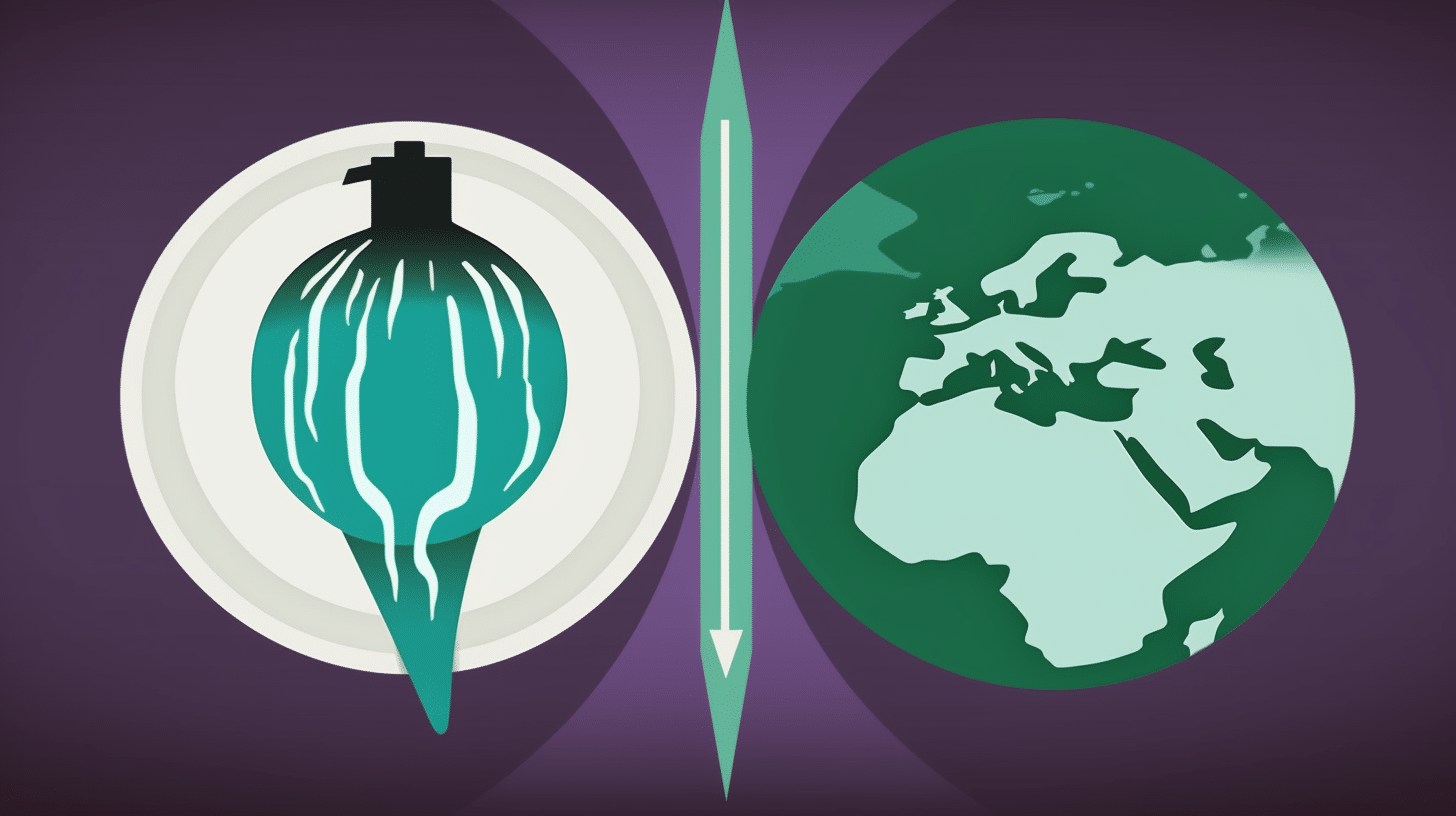The digital world is filled with numerous privacy and security concerns. As individuals increasingly rely on the internet, protecting their online data becomes more crucial than ever. Two popular privacy-enhancing tools are Tor and VPN, each offering its unique set of features. Understanding the differences and uses of these tools will empower users to make informed decisions when seeking to safeguard their online activities.
Tor, short for The Onion Router, is a network of servers (or nodes) run by volunteers, which offers anonymity by encrypting internet requests and routing them through several random middle servers. On the other hand, VPN (Virtual Private Network) uses a single server to create encrypted connections between a user’s device and the internet, thus ensuring privacy and security. Both have their advantages and drawbacks, but the main distinction lies in their architecture and the level of privacy provided.
Key Takeaways
- Tor and VPN are privacy-enhancing tools used for different purposes and with different levels of security.
- Tor provides a higher degree of anonymity, while VPN offers more robust security and faster performance.
- Combining Tor and VPN in various configurations can address specific privacy and security concerns.
Understanding Tor and VPN
Tor, short for The Onion Router, is a decentralized network designed to provide anonymity and privacy online. It uses layers of encryption and passes your data through a series of volunteer-run nodes, which helps protect your identity and browsing activity from tracking and surveillance. While Tor is excellent in providing anonymity, it tends to be slower than other options, due to the multiple nodes that data needs to pass through. You can learn more about Tor’s development and its use in the official documentation.
On the other hand, a VPN, or Virtual Private Network, is a service that establishes a secure, encrypted connection between your device and the internet via a designated server. These servers are typically owned, operated, or rented by the VPN provider, making VPNs more centralized compared to Tor. A VPN secures your data and hides your IP address from third parties, such as ISPs, governments, and hackers. While VPNs offer faster connection speeds than Tor, they depend on trusting the VPN provider not to log your traffic or compromise your data.
Both Tor and VPN aim to protect your privacy online, but there are key differences between them, such as speed, reliability, and degree of anonymity. The use of servers in VPNs contrasts with Tor’s reliance on a network of nodes, which are run by volunteers. This essential difference leads to a more decentralized network for Tor and a more centralized one for VPNs.
In general, choosing between Tor and VPN depends on your specific needs and security requirements. For instance, if high-quality encryption and privacy are your top priorities, you might opt for Tor. However, if you need faster browsing speeds and reliable access to geographically restricted content, a VPN might be a better choice.
Remember always to stay informed about the potential risks and benefits each option offers, and make sure you use reliable services, such as reputable VPN providers and the Tor Browser, to ensure the best possible protection for your online activities.
How Tor Works
The Tor network is a system designed to enhance privacy and anonymity while browsing the internet. It utilizes a series of nodes, operated by volunteers, to route your traffic through multiple layers of encryption. This process, known as onion routing, makes it difficult for anyone to trace your online activity back to you.
When using Tor, your data is sent through an entry node, which is the first point of contact within the network. This node only sees your IP address and the next node in the circuit but does not know the final destination of your data. Your traffic then passes through one or more intermediate nodes, called relays, which only know the previous and next nodes in the chain. Finally, your data reaches an exit node, which sends the traffic to its intended destination but cannot determine your original IP address.
Using this approach, Tor provides a high level of anonymity while accessing the internet, including onion sites and the dark web. Onion sites are specially designed websites that use the .onion domain and can only be accessed through the Tor network. These sites offer an additional layer of privacy and security for both the website operators and visitors.
However, it’s essential to note that while Tor offers strong privacy protection, it is not foolproof. Exit nodes can potentially monitor unencrypted traffic, and there have been instances of malicious nodes compromising user privacy. Despite these risks, Tor remains a valuable tool for those seeking a more anonymous experience on the internet.
Remember that the Tor network is built and maintained by volunteers who generously donate their resources and time. As a user, it’s important to appreciate and respect their efforts in providing this critical service for online privacy and freedom.
How VPN Works
A VPN, or Virtual Private Network, is a service designed to provide users with added privacy and security while surfing the internet. By connecting to a VPN service, your internet traffic is routed through an encrypted connection, allowing you to securely access the web and protect your sensitive data from potential snoops.
VPNs work by utilizing servers provided by the VPN provider. When you connect to a VPN server, your internet traffic is sent through this server, effectively masking your original IP address. Instead, websites and other online services will see the IP address of the VPN server, making it difficult for anyone to track your true location.
There are several VPN protocols available to facilitate the encrypted connection between your device and the VPN server. Some of the most common protocols include OpenVPN, L2TP/IPSec, and IKEv2. Each protocol has its own set of features, benefits, and potential drawbacks, but all serve to create a secure tunnel for your internet traffic.
A key aspect of VPNs is that they establish an encrypted connection between your device and the VPN server. This encryption ensures that your internet traffic cannot be easily intercepted or monitored by hackers, government agencies, or your Internet Service Provider (ISP). As a result, using a VPN can help safeguard your privacy and protect your sensitive data, such as banking information or login credentials.
In summary, VPNs work by connecting your device to a server operated by a VPN provider, routing your internet traffic through the server and encrypting the connection. This process helps to conceal your original IP address, create a secure tunnel for your internet traffic, and ultimately enable you to browse the internet with enhanced privacy and security.
Security Aspects of Tor and VPN
When discussing the security aspects of Tor and VPN, it is essential to understand how they function and protect your online privacy. Both Tor and VPNs offer encryption and anonymity in different ways.
Tor, short for The Onion Router, is a network of thousands of servers (or nodes) run by volunteers. When you access a website using Tor, your request is encrypted and sent through a random selection of middle servers, hiding your IP address and online activities from third parties, such as your ISP or government authorities (source). Since Tor relies on a decentralized network of nodes, it is difficult for a single entity to compromise its security, enhancing user anonymity.
On the other hand, VPNs (Virtual Private Networks) create a secure and encrypted connection between your device and a remote server operated by a VPN provider. This connection masks your IP address, making your online activities appear as though they originate from the VPN server, rather than your device. This adds a layer of security and privacy to your online activities (source).
In terms of encryption, most VPN providers use 256-bit encryption, one of the most secure encryption methods currently available, that is also used in HTTPS connections (source). While Tor does use encryption to secure your data as it passes through the nodes, the level of encryption varies between individual nodes, which might be a cause for concern in terms of security.
One potential downside of using a VPN is the risk of malware. Some VPN providers, particularly those offering free services, may contain malware or expose users to man-in-the-middle attacks, which can compromise their security and privacy. To mitigate this risk, it is crucial to choose a reputable and trustworthy VPN provider.
In conclusion, both Tor and VPNs offer significant security and privacy benefits to their users. However, their methods and levels of protection differ. Tor provides greater anonymity through its decentralized network of nodes, while VPNs offer more robust encryption and consistent security features. Ultimately, the choice between Tor and VPN depends on your specific needs and preferences in terms of online privacy and security.
Privacy Issues with Tor and VPN
Tor and VPN are two technologies often used for enhancing privacy and security when browsing the internet. However, they come with their own set of privacy issues.
Tor provides a high level of anonymity by encrypting your data and routing it through a network of volunteer-operated servers, called nodes. While this helps to conceal your IP address and protect against surveillance, it also means your data could be visible to third parties operating malicious nodes. Furthermore, the decentralized nature of Tor can raise concerns about the trustworthiness of these nodes.
On the other hand, VPNs create an encrypted tunnel between your device and a remote server operated by the VPN provider. This helps to hide your IP address and secure your data from your Internet Service Provider (ISP) and other third parties. VPNs are generally faster than Tor and are compatible with a wider range of applications.
However, VPNs have their own set of privacy issues. Your connection’s security is dependent on the VPN provider itself. It’s crucial to choose a provider that has a strong privacy policy and does not keep logs of your browsing history. Additionally, if the VPN provider is compromised or receives a legal request, they might disclose your information to authorities.
When using either Tor or a VPN, it’s important to be mindful of the potential risks. Online anonymity is not absolute, and your browsing habits may still be susceptible to tracking. By being aware of the privacy issues associated with each technology, you can make informed decisions and take necessary precautions to better protect your online privacy.
Performance Comparison: Tor vs VPN
Tor and VPNs are both tools for enhancing privacy and security on the internet, but they differ in terms of performance, especially when it comes to speed and bandwidth usage.
Tor network operates by routing your traffic through a series of volunteer-run nodes. This can greatly affect your internet speed due to the multiple “hops” your data must take between these nodes. As a result, Tor is typically much slower than VPNs, which can impact the user experience, especially for high-bandwidth activities like streaming videos or downloading large files.
On the other hand, VPNs can offer much better performance compared to Tor. This is because VPNs route your traffic through servers owned or rented by the VPN provider. By using dedicated resources and optimized routes, VPNs can maintain higher internet speeds without sacrificing bandwidth. In fact, some VPN providers even provide features like server selection and load balancing, which can help find the fastest, least congested server available to you.
It’s also worth noting that using a VPN, you’re less likely to encounter limitations on common activities such as P2P file-sharing, which might be restricted on some Tor exit nodes due to abuse and other factors. In contrast, many VPN providers specifically cater to P2P users and have servers optimized for file-sharing activities.
In summary, while both Tor and VPNs have their own set of pros and cons regarding privacy and security aspects, when it comes to performance-related factors such as speed, bandwidth usage, and internet activities, VPNs usually have a clear advantage. Keep in mind this comparison is primarily focused on performance, and users should also weigh the privacy and anonymity benefits of each tool when making a choice.
Tor and VPN for Specific Uses
Accessing the Dark Web
Tor is primarily known for its ability to access the dark web, a hidden part of the internet that cannot be accessed through traditional search engines. It uses a network of volunteer nodes to encrypt and route your traffic, providing strong anonymity, essential for accessing dark web sites.
On the other hand, VPNs are not designed for accessing the dark web but can be used in combination with Tor. Using Tor over VPN adds an extra layer of security by hiding your connection to the Tor network from your ISP or other third parties.
Internet Censorship and Geo-Restrictions
VPNs are commonly used to bypass geo-restrictions and access blocked content imposed by governments, workplaces, or streaming services. They work by masking your IP address and routing your traffic through a server in another location, making it appear that you are accessing the internet from that region.
Tor can also help in bypassing censorship but is generally much slower than a VPN, making it less suitable for overcoming geo-restrictions, particularly in streaming high-quality videos. Additionally, Tor is more easily blocked by some censors, who target its known entry and exit nodes.
Sharing Sensitive Information
Both Tor and VPNs can be effective in protecting sensitive information. Tor provides a high level of anonymity due to its decentralized structure, which can be useful when sharing sensitive information or communicating securely. However, its slower speed can be an issue in some cases.
Meanwhile, VPNs offer faster speeds and can encrypt your data with strong protocols, making them well-suited for tasks such as online banking, sharing sensitive files over P2P file sharing platforms, or secure video conferencing. However, it’s essential to choose a trustworthy VPN provider with a strict no-logging policy to ensure your data remains private.
Common VPN Services and their Compatibility with Tor
When it comes to combining Tor with VPN services, it is important to understand the compatibility of these services with different devices and operating systems. Two of the popular VPN services for this purpose are NordVPN and ProtonVPN. In this section, we will discuss their compatibility with Tor, along with device compatibility for Windows and iOS users.
NordVPN is widely known for its strong security features and ability to work seamlessly with Tor. This service supports Tor over VPN functionality, providing an extra layer of security to your online activities. With NordVPN, you can easily access the Tor network on your Windows or iOS devices. The dedicated Onion Over VPN feature is available on the native NordVPN apps for both platforms, allowing users to remain anonymous while browsing the internet or accessing Onion websites. This also ensures that your ISP or other third-party entities cannot see that you are using Tor.
ProtonVPN, another popular choice among privacy-conscious users, also offers a feature called Secure Core to enhance your online security and privacy. Although ProtonVPN does not offer a native Tor over VPN option like NordVPN, you can still configure their service to work with Tor. With ProtonVPN installed on your device, you can route the traffic through their Secure Core servers and then access the Tor network. This setup is compatible with Windows and iOS devices, allowing users on these platforms to take advantage of the enhanced privacy provided by this combination.
In summary, both NordVPN and ProtonVPN offer suitable compatibility with Tor and support for various devices, including Windows and iOS. NordVPN stands out for its native integration of Tor over VPN, while ProtonVPN requires manual configuration. Regardless of the choice, using these VPN services with Tor will help enhance your online privacy and strengthen your security on the internet.
Special Cases: Tor over VPN vs VPN over Tor
In certain scenarios, you may want to enhance your privacy and security by using both Tor and VPN together. There are two ways to achieve this: Tor over VPN and VPN over Tor. Each method has its pros and cons, and understanding the difference is crucial for making an informed decision.
Tor over VPN involves connecting to a VPN first, followed by the Tor network. In this setup, your internet traffic is encrypted and passes through the VPN server before entering the Tor network. The key advantage of Tor over VPN is that it allows you to access the dark web with added security. Additionally, this method ensures your ISP is unaware of your Tor usage. One of the downsides, however, is that the Tor exit node can still view your traffic if the connection is unencrypted. Furthermore, you must trust your VPN provider, as they will know your real IP address.
On the other hand, VPN over Tor means connecting to the Tor network first and then routing your traffic through a VPN. This method is beneficial for users who want to shield themselves from their VPN provider’s view. With VPN over Tor, your real IP address is hidden from the VPN service, and the Tor exit node will only see the VPN server’s IP. The main drawback of this approach is that it’s typically slower than Tor over VPN and could limit your ability to access certain websites that block known Tor exit nodes.
Both configurations offer multi-hop and multi-layered encryption. Multi-hop refers to the process of routing your traffic through multiple servers or nodes to increase anonymity. Multi-layered encryption, as the name suggests, is the use of multiple layers of encryption to secure data transmissions.
In summary, choosing between Tor over VPN and VPN over Tor depends on your specific needs and priorities. Tor over VPN is more suitable for accessing the dark web and ensuring your ISP remains unaware of your Tor usage. VPN over Tor, however, offers greater protection from your VPN provider. While neither option is perfect, both methods provide enhanced privacy and security compared to using Tor or VPN alone.
Possible Risks and Considerations
When comparing Tor and VPN services, it’s important to be aware of any potential risks, limitations, and considerations when using these tools for online privacy and security.
One of the main concerns with using Tor is the possibility of being targeted by hackers. As the Tor network routes your traffic through multiple nodes worldwide, there is a chance that a malicious node operator could try to intercept and monitor your data. In contrast, VPN providers usually have a selection of trusted servers, which can provide more security than random Tor nodes.
Another concern with Tor usage is the potential for illegal activities. Since Tor is known for providing a high level of anonymity, it has become a hub for criminals and those engaging in illegal activities. As a user, you may not want to be associated with such activities, even inadvertently. On the other hand, reliable VPN providers typically have no log policies and strong encryption, which can reduce the likelihood of your data being used for unlawful purposes.
The use of free VPNs can also pose risks to users. These services may lack proper security measures and could sell your personal data to advertisers or other third parties. Choosing a reputable, paid VPN service is crucial to help safeguard your privacy and security online.
Whistleblowers, journalists, and activists often rely on tools like Tor and VPNs to protect themselves and their sources. While both options offer a degree of anonymity, each has its limitations. Tor may provide greater levels of anonymity; however, the slow connection speeds and potential exposure to malicious nodes might be a concern. On the other hand, a reliable VPN can provide faster speeds and more robust encryption, although their ability to log your traffic remains a possible risk.
Countries like Russia and China have strict internet censorship laws, and using Tor or VPN services can be a challenge. Depending on the country’s regulations, using these tools could be illegal or heavily monitored by the government. It’s vital to be aware of the local laws in such countries and consider alternative privacy solutions if necessary.
In conclusion, when choosing between Tor and VPN, it’s essential to consider the potential risks and limitations associated with each option. Selecting the appropriate tool for your specific needs will help ensure you maintain your online privacy and security.
Frequently Asked Questions
What are the main differences in the security and privacy features of Tor and VPNs?
Tor and VPNs approach security and privacy differently. Tor uses onion routing, encrypting data in multiple layers and passing it through several nodes run by volunteers, making it hard to trace the data’s origin. On the other hand, VPNs encrypt your connection and route it through a single server, concealing your IP address and geographic location. While both methods offer protection against monitoring, VPNs rely on the trustworthiness of the provider, as they can potentially log user data.
How do the anonymity levels of Tor and VPNs compare?
In terms of anonymity, Tor provides higher levels of protection due to its decentralized nature and multiple layers of encryption. With VPNs, the provider has the technical capability to log your traffic, making it critical to choose a reputable VPN service. Whereas, the decentralized and volunteer-led nature of the Tor network makes it less susceptible to monitoring by any single entity.
What is the difference in the network architecture of Tor and VPN services?
VPNs use a network of dedicated servers that are owned or leased by the VPN provider, while Tor relies on a network of volunteer-run nodes. This results in a more centralized structure for VPNs, whereas Tor has a decentralized architecture. VPN users connect to a single VPN server, while Tor traffic is routed through multiple nodes before reaching the destination, offering a higher level of anonymity.
How does the speed and performance of Tor and VPNs differ?
Since Tor routes your data through multiple nodes, it can be significantly slower than a VPN. VPNs generally offer better performance and faster connection speeds, as the data only passes through one server. However, this depends on the VPN provider, server location, and user’s geographical location.
Can a VPN and Tor be used simultaneously for enhanced security?
Yes, you can use a VPN and Tor together for an added layer of security. By connecting to a VPN before using the Tor network, known as Tor over VPN, your ISP will only be able to see your encrypted VPN connection. This approach also prevents potential Tor exit node attacks. Using VPN over Tor is another method; however, it is less common and might not be as beneficial in terms of anonymity.
What are the common use cases for choosing Tor over a VPN or vice versa?
When strong anonymity is the top priority, Tor offers a higher level of protection than a VPN due to its decentralized nature and multiple layers of encryption. It is frequently used for accessing the dark web, political activism, and circumventing censorship. On the other hand, VPNs are better suited for day-to-day activities like streaming, online gaming, and secure browsing, as they provide faster connections and better performance while still improving privacy levels compared to a regular internet connection.






